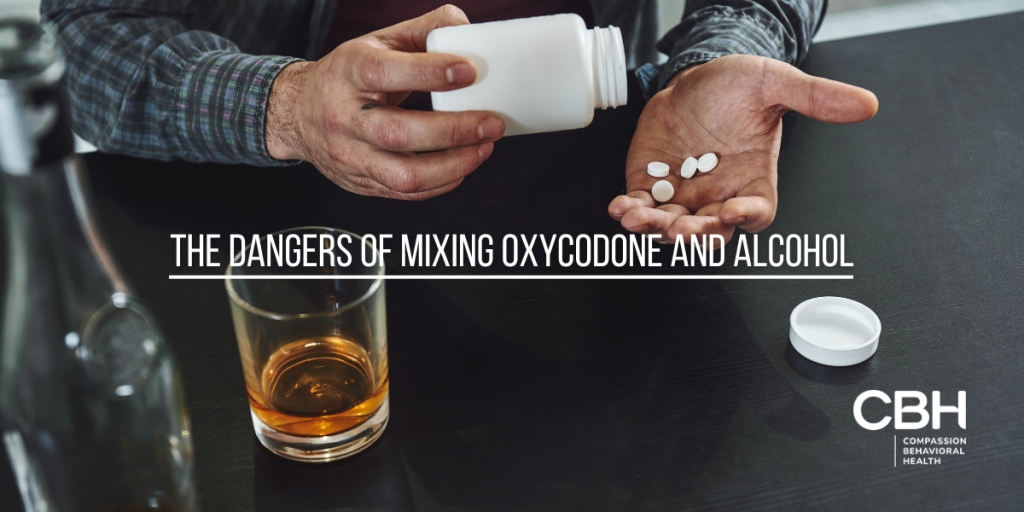Oxycodone and alcohol – both substances that, when used improperly, can lead to serious health risks and complications. This article aims to shed light on the dangers that arise from combining these two substances, as well as the effects they have on the body individually.
Understanding Oxycodone: Its Uses and Effects
What is Oxycodone?
Oxycodone belongs to a class of medications called opioids. It is a potent pain reliever often prescribed to manage moderate to severe pain. This medication affects the way the brain and body perceive and respond to pain signals.
Oxycodone is derived from the opium poppy plant and works by binding to opioid receptors in the brain and spinal cord. By doing so, it blocks the transmission of pain signals and produces a sense of euphoria and relaxation.
Due to its high potency, oxycodone is classified as a Schedule II controlled substance by the Drug Enforcement Administration (DEA). This means that it has a high potential for abuse and can lead to physical and psychological dependence.
Medical Uses of Oxycodone
Oxycodone is commonly prescribed to individuals recovering from surgery or experiencing chronic pain due to medical conditions such as cancer or severe injuries. When used as directed by a healthcare professional, oxycodone can provide much-needed relief.
In addition to its pain-relieving properties, oxycodone can also help improve the quality of life for patients with terminal illnesses. By alleviating pain, it allows individuals to engage in daily activities, sleep better, and maintain a more positive outlook.
It is important to note that oxycodone should only be used under the supervision of a healthcare professional. They will carefully assess the patient’s condition and prescribe the appropriate dosage to minimize the risk of side effects and dependence.
Side Effects of Oxycodone
Like most medications, oxycodone can have side effects. These may include drowsiness, constipation, nausea, and dizziness. Some individuals may also experience more severe side effects, such as respiratory depression or allergic reactions, which require immediate medical attention.
Constipation is a common side effect of oxycodone due to its effect on the gastrointestinal system. It is important for patients to maintain a healthy diet, drink plenty of fluids, and engage in regular physical activity to prevent or manage constipation.
In rare cases, oxycodone can suppress the respiratory system, leading to respiratory depression. This is more likely to occur when the medication is taken in higher doses or combined with other central nervous system depressants, such as alcohol or benzodiazepines. Patients should be closely monitored for signs of respiratory depression, such as shallow breathing or difficulty breathing.
Allergic reactions to oxycodone are rare but can occur. Symptoms may include rash, itching, swelling, or difficulty breathing. If any of these symptoms occur, immediate medical attention should be sought.
Patients need to communicate any side effects or concerns to their healthcare provider. They can help adjust the dosage or explore alternative pain management options if necessary.
The Role of Alcohol in the Body
Understanding Alcohol Consumption
Alcohol is commonly consumed for its relaxing effects and the social enjoyment it can bring. However, alcohol can also lead to impaired judgment and physical coordination, affecting cognitive and motor functions.
When alcohol is consumed, it enters the bloodstream through the stomach and small intestine. From there, it travels to the brain, where it affects the central nervous system. The effects of alcohol on the body can vary depending on factors such as the amount consumed, the individual’s tolerance, and the rate of consumption.
Alcohol acts as a depressant, slowing down brain activity and inhibiting the release of certain neurotransmitters. This is what contributes to the feelings of relaxation and euphoria that many people experience when drinking. However, as the blood alcohol concentration increases, the effects become more pronounced, leading to impaired judgment, decreased inhibitions, and a loss of coordination.
Short-term and Long-term Effects of Alcohol
While the occasional drink may not cause harm, excessive or long-term alcohol consumption can have severe consequences for the body. Short-term effects include slurred speech, impaired memory, and erratic behavior. These effects can be particularly dangerous when it comes to activities such as driving, as alcohol impairs reaction times and decision-making abilities.
Long-term effects encompass liver damage, increased risk of cancer, and psychological dependence. The liver is responsible for metabolizing alcohol, but excessive drinking can overwhelm its ability to do so. This can lead to inflammation, scarring, and even liver failure. Additionally, chronic alcohol consumption has been linked to an increased risk of various types of cancer, including liver, breast, and esophageal cancer.
Psychological dependence on alcohol, also known as alcoholism, is a serious condition that can have devastating effects on an individual’s life. It is characterized by a strong craving for alcohol, an inability to control or limit drinking, and withdrawal symptoms when alcohol is not consumed. Alcoholism can lead to a range of physical and mental health problems, as well as strained relationships and difficulties in work or school.
It is important to note that the effects of alcohol can vary from person to person. Factors such as genetics, overall health, and the presence of other substances in the body can influence how alcohol is metabolized and its impact on an individual. It is always advisable to drink responsibly and be aware of the potential risks associated with alcohol consumption.
The Deadly Combination: Oxycodone and Alcohol
The combination of oxycodone and alcohol is a topic that should not be taken lightly. It is crucial to understand the potential dangers and risks associated with this deadly combination. When these two substances are combined, a dangerous interaction occurs within the body.
How Oxycodone and Alcohol Interact
Oxycodone, a powerful opioid pain medication, and alcohol, a widely consumed substance, both have the ability to depress the central nervous system. When taken separately, they can already cause significant side effects. However, when combined, the effects can be intensified and even life-threatening.
One of the primary concerns when mixing oxycodone and alcohol is the impact on the respiratory system. Both substances can slow down breathing, leading to a decreased oxygen supply to vital organs. This can result in breathing difficulties, shallow breathing, or even respiratory failure.
Another dangerous effect of this combination is the impact on the cardiovascular system. Oxycodone and alcohol can both cause a decrease in heart rate, leading to a dangerously slow heartbeat. This can disrupt the normal functioning of the heart and potentially lead to cardiac arrest.
Furthermore, the combination of oxycodone and alcohol can result in extreme drowsiness and sedation. This can impair cognitive function, coordination, and reaction time, increasing the risk of accidents, falls, and injuries.
Potential Health Risks and Complications
Mixing oxycodone and alcohol significantly increases the risk of overdosing. Both substances enhance each other’s effects, making it easier to reach dangerous levels of intoxication. This is particularly concerning because an overdose can be fatal.
Moreover, the combination of oxycodone and alcohol can have severe long-term consequences on the liver. Both substances are metabolized by the liver, and excessive consumption can lead to liver damage or even liver failure. This can have a lasting impact on overall health and well-being.
Respiratory failure is another potential health risk associated with the combination of oxycodone and alcohol. The depressant effects on the respiratory system can become so severe that breathing becomes inadequate, leading to a life-threatening situation.
Additionally, long-term cognitive impairment is a significant concern when mixing these substances. The combination can impair memory, attention, and overall cognitive function. This can have a profound impact on an individual’s ability to perform daily tasks and maintain a high quality of life.
It is essential to understand that the dangers of combining oxycodone and alcohol outweigh any perceived benefits. If you are taking oxycodone for pain management, it is crucial to consult with your healthcare provider about the potential risks and alternative options.
In conclusion, the combination of oxycodone and alcohol is a deadly combination that should be avoided at all costs. The unpredictable and potentially fatal effects on the central nervous system, respiratory system, cardiovascular system, and cognitive function make it an extremely dangerous practice. It is crucial to prioritize your health and well-being by avoiding the simultaneous use of these substances.
Recognizing Signs of Oxycodone and Alcohol Abuse
Physical Symptoms and Behavioral Changes
Signs of oxycodone abuse and alcohol abuse vary from person to person. Physical symptoms may include bloodshot eyes, slurred speech, and changes in appetite or sleep patterns. Behavioral changes, such as secretive behavior, neglect of responsibilities, and increased tolerance to the substances, can also be indicators of abuse.
Psychological Indicators of Substance Abuse
Mental health issues may coincide with substance abuse. Individuals combining oxycodone and alcohol may experience increased anxiety, depression, and mood swings. It is crucial to recognize these psychological indicators and seek appropriate help for those in need.
Treatment Options and Recovery for Oxycodone and Alcohol Abuse
Detoxification and Rehabilitation
Treatment for oxycodone and alcohol abuse typically begins with detoxification to rid the body of these substances. This process should be conducted in a medically supervised environment to ensure the individual’s safety. Following detox, a comprehensive rehabilitation program can provide the necessary support and tools for recovery.
Therapy and Support Groups
Therapy is an integral part of recovery, allowing individuals to address the underlying issues contributing to their abuse. Cognitive-behavioral therapy (CBT) and individual counseling are common approaches. Support groups, such as Alcoholics Anonymous (AA) or Narcotics Anonymous (NA), can provide encouragement and guidance throughout the recovery journey.
Medications and Ongoing Care
In some cases, medications may be prescribed to aid in the recovery process. These can help manage withdrawal symptoms, reduce cravings, or treat coexisting mental health conditions. Ongoing care, including regular check-ups and support, is crucial to maintain long-term sobriety and prevent relapse.
Ultimately, the dangers of mixing oxycodone and alcohol cannot be underestimated. It is essential to seek professional help and educate oneself about the risks involved. By understanding the potential consequences, individuals can make informed decisions and prioritize their health and well-being.
Oxycodone and Alcohol Addiction Treatment at CBH
At Compassion Behavioral Health (CBH), we offer specialized treatment for individuals struggling with oxycodone and alcohol addiction. Our program recognizes the unique challenges and dangers posed by the combination of these substances. We provide a comprehensive approach that addresses both the physical and psychological aspects of addiction. If you or your loved one is suffering from oxycodone addiction, call us today to learn what treatment options are available for you.







